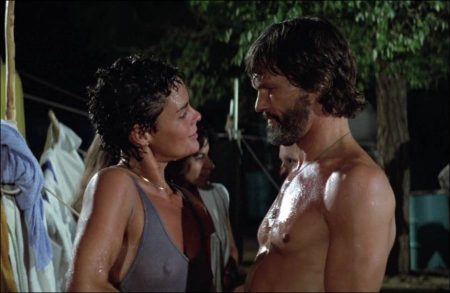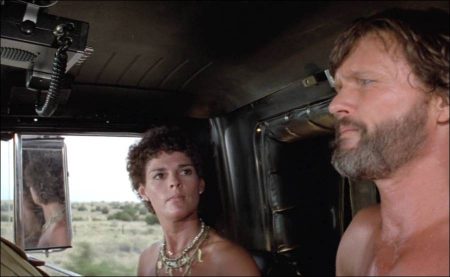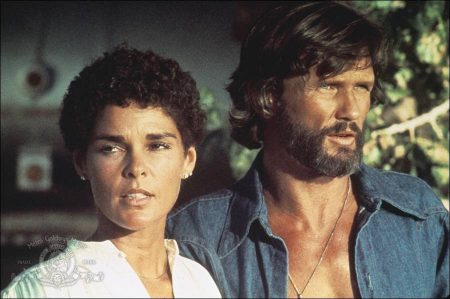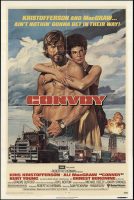Convoy movie storyline. While driving through the Arizona desert, Albuquerque based independent trucker Martin Penwald – who goes by the handle “Rubber Duck” – along with his fellow truckers “Pig Pen” and “Spider Mike”, are entrapped by unscrupulous Sheriff Lyle “Cottonmouth” Wallace using a key tool of the trucker’s trade, the citizens’ band (CB) radio.
Rubber Duck and Cottonmouth have a long, antagonistic history. When this encounter later escalates into a more physical one as Cottonmouth threatens Spider Mike, a man who just wants to get home to his pregnant wife, Rubber Duck and other the truckers involved, including Spider Mike, Pig Pen and “Widow Woman”, go on the run, figuring the best thing to do being to head to New Mexico to avoid prosecution.
Along for the ride is Melissa, a beautiful photographer who just wanted a ride to the airport. As news of what happened spreads over the CB airwaves, other truckers join their convoy as a show of support. Cottonmouth rallies other law enforcement officers throughout the southwest, they who soon learn that stopping Rubber Duck, the face of the now highly public standoff, is not as easy as shooting him and the truck due to his highly explosive cargo. As the standoff escalates, New Mexico Governor Jerry Haskins joins the fray, he who sees the strong public support for the truckers being something on which he can capitalize politically.
Convoy is a 1978 action-comedy film directed by Sam Peckinpah and starring Kris Kristofferson, Ali MacGraw, Ernest Borgnine, Burt Young, Madge Sinclair and Franklyn Ajaye. The film is based on the 1975 country and western novelty song “Convoy” by C. W. McCall. The film was made when the CB radio/trucking craze was at its peak in the United States, and followed the similarly themed films White Line Fever (1975) and Smokey and the Bandit (1977). It was the most commercially successful film of Peckinpah’s career.
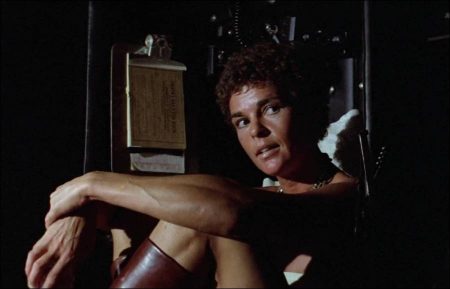
About the Production
Convoy was filmed almost entirely in the state of New Mexico. Production began in 1977 when the CB radio/trucking craze was at its peak, made during the same period as such films as Smokey and the Bandit (1977), Handle with Care (1977), Breaker! Breaker! (1977) and High-Ballin’ (1978), as well as the television series Movin’ On (1974–1976) and B. J. and the Bear (1979–1981).
During this period of Sam Peckinpah’s life, it was reported he suffered from alcoholism and drug addiction. His four previous films, Cross of Iron (1977), The Killer Elite (1975), Bring Me the Head of Alfredo Garcia (1974), and Pat Garrett and Billy the Kid (1973), had struggled at the box office and the director needed a genuine blockbuster success.
Unhappy with the screenplay written by B.W.L. Norton, Peckinpah tried to encourage the actors to re-write, improvise and ad-lib their dialogue, with little success. In another departure from the script, Peckinpah attempted to add a new dimension to the film by casting a pair of black actors as members of the convoy including Madge Sinclair as Widow Woman and Franklyn Ajaye as Spider Mike. The director’s health became a continuing problem, so friend and actor James Coburn was brought in to serve as second unit director. Coburn directed much of the film’s footage while Peckinpah remained in his on-location trailer.
Peckinpah’s original rough cut of Convoy, assembled by Peckinpah and his long time editor Garth Craven in early 1978, had an estimated running time of 220 minutes. According to the book If They Move… Kill ‘Em!: The Life and Times of Sam Peckinpah by David Weddle and the Convoy documentary Passion & Poetry: Sam’s Trucker Movie, Peckinpah’s rough cut did not have any musical score other than the title song and “Blow The Gates To Heaven” by Richard Gillis (who had previously worked with Peckinpah on The Ballad of Cable Hogue). Jerry Fielding, who composed music for many of Peckinpah’s previous films, was also hired to do the score for Convoy.
After seeing Peckinpah’s rough cut, EMI and their executive producer Michael Deeley fired him and Craven from the film and hired another editor, Graeme Clifford, to drastically reduce the running time and emphasise aspects that would play well to Smokey and the Bandit’s audience; Hal Needham’s comedy had been a huge hit a year earlier. Peckinpah essentially disowned the released version. Garner Simmons, author of Peckinpah: A Portrait in Montage, said that EMI and Clifford’s version of Convoy “cut the guts out of it”.
The picture finished eleven days behind schedule at a cost of $12 million, more than double its original budget. The famous scene where the tanker truck goes off a bridge and explodes was filmed in Needles, California, on a one-way bridge over the Colorado River between Arizona and Needles. The Needles City Fire Department provided fire protection during this scene. The bridge was soon removed thereafter as a new span connected the two sides of the river.
Peckinpah has a cameo as a sound man during an interview scene. Rubber Duck’s truck is generally represented in the film as a 1977 Mack RS712LST although several other Mack RS700L series trucks were used as a double and as stationary props.[9] The original 1977 Mack truck, its on-road movie double, and the only original remaining tank trailer are on display at the Museum of Transportation outside St. Louis, Missouri.
Convoy (1978)
Directed by: Sam Peckinpah
Starring: Kris Kristofferson, Ali MacGraw, Ernest Borgnine, Burt Young, Madge Sinclair, Franklyn Ajaye, Brian Davies, Seymour Cassel, Cassie Yates, Walter Kelley, Billy Hughes, Jorge Russek
Screenplay by: B. W. L. Norton
Production Design by: Fernando Carrere
Cinematography by: Harry Stradling, Jr.
Film Editing by: John Wright, Garth Craven
Set Decoration by: Frank Lombardo
Art Direction by: J. Dennis Washington
Music by: Chip Davis
MPAA Rating: None.
Distributed by: United Artists
Release Date: June 28, 1978 (United States)
Views: 798
